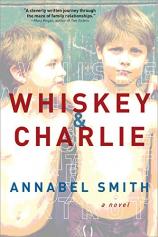Whiskey and Charlie
Review
Whiskey and Charlie
For most of us in life, it’s easy to feel invincible before tragedy strikes. It’ll never happen to me, we say. Our loved ones? Yes, they’re untouchable. If and when something catastrophic does occur, it’s the other guy’s fault or a matter of chance, we tell ourselves smugly. This protective armor and invulnerable optimism is how we get through the day.
But what if, deep down, it is our fault. What if we’re the root of the problem and just too oblivious to see it?
In Australian native Annabel Smith’s deceptively heavy novel, WHISKEY AND CHARLIE, this kind of misguided thinking is what drives most of the narrative. It propels characters to lash out and make impulsive decisions while ignoring potential consequences. Until, of course, fate steps in --- a dreadful event that forces everyone involved to rethink their motives and reconsider their choices so they can become healthier, more cognizant of their surroundings, “right” with the world.
But by that point, isn’t it too late? And more importantly, why must it take misfortune to set people straight?
"[W]hat WHISKEY AND CHARLIE really gives us is a powerful reminder that life is short, loved ones shouldn’t be taken for granted, and forgiveness is often the key to contentment."
At its core, WHISKEY AND CHARLIE is a story about a pair of identical twins who drift apart over time. Since the boys were toddlers, they have competed for attention --- for their parents’ love, for dates to the prom, for the lucrative job. In almost every circumstance, Whiskey comes out on top. He is the golden boy --- a smidge taller and more beautiful, a natural with the ladies and never without a girlfriend, an advertising executive with a flashy car and designer clothes.
As for Charlie, he spends most of his time feeling resentful of his brother. Sure, he enjoys his job as a teacher’s aide. Yes, his model girlfriend Juliet chose him over Whiskey, whom she dated first. But still, out of habit, Charlie can’t stop comparing himself to Whiskey or live up to his own standards. Before long, he decides to stop speaking to Whiskey altogether.
Such is the stuff family feuds are made of, and if life had been allowed to follow its predictable course, Whiskey and Charlie would have grown irreparably apart. Instead, they’re reunited through tragedy. Whiskey lands in a coma after an accident, and Charlie is left pondering what he might say in honorarium if there’s a need for a funeral.
As one might imagine from a novel that throws a spotlight onto each of grief’s stages, circumstances become fairly tenuous once the narrative hits the hospital corridors. But Smith adds an extra element to the book’s structure that carries the reading experience to the next level. She organizes each chapter around a letter of the two-way radio alphabet --- something the twins memorized when they were children using walkie-talkies. Starting with Alpha and ending with Zulu, Smith alternates snippets of Whiskey’s time in the hospital with flashbacks of the boys’ lives together.
It’s an interesting writing experiment and one that works --- for the most part. To wait for the chapter entitled “X-Ray” to really delve into Whiskey’s condition isn’t ideal, and the book’s final pages do feel a little rushed. Yet, overall, none of the writing feels formulaic, and Smith’s dogged approach to flushing out Charlie and Whiskey’s relationship without giving Whiskey a say is a smart gamble to take, even if it means relying on other characters --- especially curmudgeonly Charlie --- to do the job for her.
Above all, what WHISKEY AND CHARLIE really gives us is a powerful reminder that life is short, loved ones shouldn’t be taken for granted, and forgiveness is often the key to contentment.
Reviewed by Alexis Burling on April 8, 2015
Whiskey and Charlie
- Publication Date: April 7, 2015
- Genres: Fiction
- Paperback: 336 pages
- Publisher: Sourcebooks Landmark
- ISBN-10: 149260786X
- ISBN-13: 9781492607861





